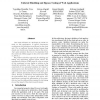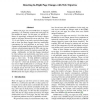9 search results - page 2 / 2 » Detecting Malicious JavaScript Code in Mozilla |
ACSAC
2010
IEEE
13 years 2 months ago
2010
IEEE
The JavaScript language is a core component of active and dynamic web content in the Internet today. Besides its great success in enhancing web applications, however, JavaScript p...
ICST
2011
IEEE
12 years 8 months ago
2011
IEEE
User input validation is a technique to counter attacks on web applications. In typical client-server architectures, this validation is performed on the client side. This is ineff...
DIMVA
2009
13 years 6 months ago
2009
Drive-by download attacks are among the most common methods for spreading malware today. These attacks typically exploit memory corruption vulnerabilities in web browsers and brows...
NSDI
2008
13 years 7 months ago
2008
While web pages sent over HTTP have no integrity guarantees, it is commonly assumed that such pages are not modified in transit. In this paper, we provide evidence of surprisingly...


